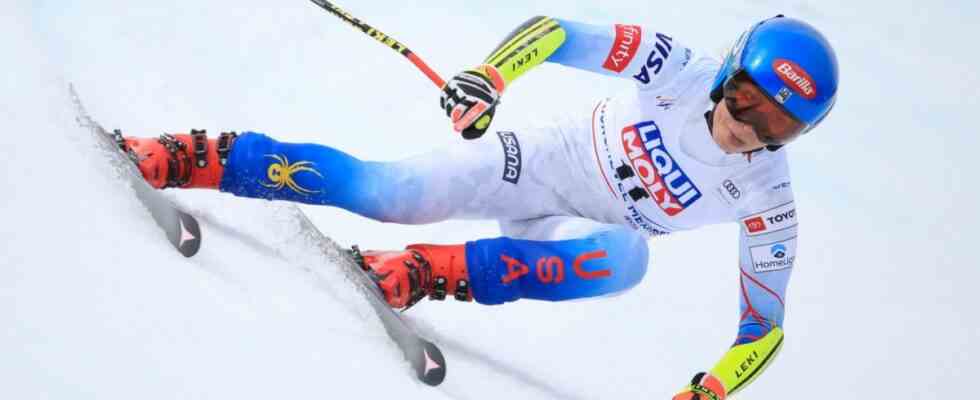Mikaela Shiffrin once said that she had to learn that first: to be appropriately happy about the successes she has been collecting for years like other garden gnomes or surprise eggs. She used to trudge to the hotel after a win, studying her runs and those of her opponents for hours. Somehow you had to be able to squeeze a few more milliseconds out of your right turn in order to get a little faster, a little more every day.
On Thursday in Courchevel, at the last Super-G of the alpine ski racers’ season, Shiffrin seemed to have banished this thought to the furthest corner of her conscience for a while. When Petra Vlhova, her last opponent in the struggle for the overall World Cup ranking, tumbled to the finish in 17th place, the first tears crept into Shiffrin’s eyes, you could see that clearly, even behind the mirrored glasses. The large crystal ball was now officially in her possession, for the fourth time, which always seems very inevitable given Shiffrin’s talent. But it has never been, and it has seldom been as clear as it was this winter.
They had all carried their rucksacks to the last races in Meribel and Courchevel, large and small, as is the case after half a year on a ski racing tour. Vlhova, the defending champion, was also just too tired to seriously threaten Shiffrin again – she had bet everything on the races in Beijing, where she went on to win the slalom, Slovakia’s first Winter Olympics gold. The German representatives at the season finale, like Kira Weidle, also seemed exhausted and “a bit at a loss”, as Weidle admitted. 18th place in the downhill, 20th place in the Super-G, that was not exactly congruent with the demands of a World Cup runner-up in the downhill. And Shiffrin, she spoke as openly as ever about a “very special season” in which there were “many great moments”. But: “There were also these moments when I was lower than ever in my career. I felt so much weight and collapsed.”
Sometimes everything felt “so hopeless”, says Shiffrin
Not even a month ago, at the Winter Games in Beijing, the scene witnessed a strange and eerie metamorphosis: how art slipped away from the best female ski racer in recent history and the present within days. In giant slalom, her second best discipline, she fell off the course after just a few turns. She took the defeat very personally, as did all her few disappointments, she later admitted. But whatever else had driven her to come back stronger was now working against her. Two days later, the slalom was coming up, and Shiffrin was eliminated again. She rehabilitated a bit in Super-G and downhill, then slid off the course again in combined with the medal in mind. Five great chances, no return – from an athlete who wins on average every third (!) race she contests.
And every time the American went in front of the cameras and microphones and tried to explain the seemingly inexplicable: how everything had simply become too much, the competition, her own expectations and those of others, also at home, which mostly only came out of her football, baseball, ice hockey, basketball bubble at the Olympics peeks out. And then she feels stupid, said Shiffrin, that she takes it all to heart – aren’t there much worse things in the world right now?
In the end, that was perhaps the even more valuable side that Shiffrin brought out this season: how much uncertainty is associated with showing off a talent again and again to an astonished public; that the ease with which she seems to hurtle down the ice slopes looks easy at best. The American recently spoke very openly about her vulnerability: how long it took her to lift the fog of pain after her father died in an accident two years ago. How she had sometimes forgotten the course guidance in training and even in the race. How she slowly felt confidence again. How she got together with the Norwegian Aleksander Aamodt Kilde, next to the Swiss Marco Odermatt the best ski racer of the present, who received his trophies in Courchevel as the best of the year in the downhill and in the super-G. And who, as Shiffrin’s mother Eileen had emphasized before the season, led her daughter back onto a path where she could laugh again.
Finally carefree again in the snow: Mikaela Shiffrin is happy about her extraordinarily good late form.
(Photo: Pontus Lundahl/AFP)
In the meantime everything felt “so hopeless”, said Shiffrin on Thursday ZDF-Microphone. But the people around her “always get me back on track”. And now?
Shiffrin’s stats read after every winter, yes still a bit bigger, and there’s still a lot left in the candle of her sporting life, at least in theory. Already, at the age of 27, she has as many overall World Cup victories as her compatriot Lindsey Vonn (only Annemarie Moser-Proll was better in the women’s with six titles); she has already won more races in a single discipline (47, in slalom) than any other alpine athlete. And then there’s this mark that they’ve all been chasing in vain for so far: Ingemar Stenmark’s 86 World Cup victories. Shiffrin is 74 since her downhill win on Wednesday.
The fact that she has no intention of stopping the hunt was already indicated in Beijing, when she was as far down as she had ever been; their social media channels were flooded with unappetizing messages. “I’m stubborn as shit,” Shiffrin wrote at the time. That too, well, very openly.

